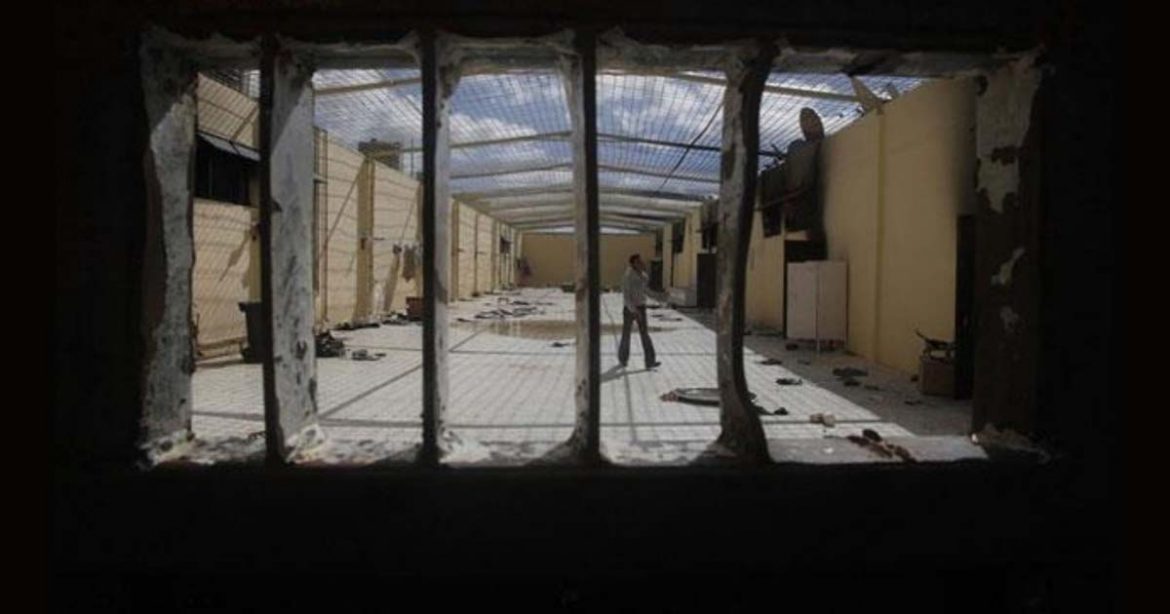Egypt’s prisons are incubators of extremists, new report warns
The Cairo Institute of Human Rights Studies (CIHRS) released today 8 May 2019 the Arabic translation of Like a Fire in a Forest: ISIS Recruitment in Egypt’s Prisons, a report by Human Rights First (HRF) originally published in February of this year. The report, based on the harrowing testimony of former prisoners, details how Egypt’s prisons – in recent years under the rule of President Abdel Fattah al-Sisi – have become one of ISIS’ most powerful recruiting tools. The conclusions of the HRF report resonate with those of the 2017 CIHRS book Arab Authoritarianism: The Incubators of Terror,[1] which examined the link between authoritarian policies and the root causes of terrorism throughout the Middle East and North Africa region.
The translated report is intended to be a resource for organizations, intellectuals, academics, and investigative journalists in Egypt and the wider region to shed light on how repressive policies in general, and prisons specifically, can serve to incite and escalate terrorism. The report further raises reflections upon how the legitimacy of dictatorships in the region is based upon exploiting the threat of terrorism; the same terrorism fueled by these dictatorships through their brutal policies and, as is starkly illustrated by Egypt, through their inhumane prisons.
Victims of the Egyptian government’s widening war on terrorism are becoming combatants– in swelling numbers – on the side of violent extremist groups. This is a foreseeable outcome of the military’s brutal counterterrorism policies in the Sinai region in conjunction with its widening repressive net, both of which increasingly target peaceful citizens with no evident inclination toward violent extremism, pushing them into the embrace of radical ideology.
The report conveys the experience of a man from the Sinai region whose family was killed and his home destroyed in a military bombing, and of a teenager – the son of a military officer – who was arrested and tortured for simply being in the wrong place at the wrong time. Both men became radicalized and were linked to ISIS, with the teenager alleged as a perpetrator of the 2016 ISIS suicide attack on a Coptic church in Cairo that left dozens of civilians dead.
In the cases of both men, violent extremist groups represented the only apparent means of redress against grave governmental injustice and infringement upon their rights. These men are not isolated cases but representatives of a dangerous trend resulting from the “conventional security-only approach that only inflames radicalization in light of rampant political, economic, and social grievances across the Arab region; creating a volatile context further exacerbated by repressive and marginalizing policies.”[2]
The influence of violent extremist groups is especially pronounced in Egypt’s prisons, which in recent years under President Abdel Fattah al-Sisi, are alleged to have become unprecedentedly brutal and inhumane. The report concludes that ISIS gains traction under the worsening conditions of Egypt’s prisons by exploiting two predictable desires of prisoners after suffering torture and maltreatment: the desire for protection, and the desire for revenge. At the same time, ISIS exploits the feelings of hopelessness and abandonment prevailing among those languishing in Egypt’s prisons, together with the lack of any peaceful alternative for change in Egypt.
The report concludes that the mounting evidence of the corollary between Sisi’s repressive policies in general, and the conditions of Egypt’s prisons specifically, to nurturing terrorism has become noticed by the international community, including Egypt’s allies. In a bipartisan letter urging the US administration to stand against Egypt’s rights abuses, or else risk “[perpetuating] the very sorts of conditions that help breed violent extremism and terrorism.”
The senators’ warning echoes reinforces the view of CIHRS director Bahey eldin Hassan, in his introduction to the 2017 CIHRS book: “We can no longer ignore the relationship between the perpetration of human rights and humanitarian crimes committed by some governments and the rise of radicalization and the proliferation of terrorism.”
[1] In 2017 CIHRS has released a new book titled Arab Authoritarianism: The Incubators of Terror examining the link between the authoritarian policies and practices of most Arab governments featuring experts, academics, and human rights practitioners from across the Middle East and North Africa region who dissect the contexts and root causes of terrorism in Syria, Iraq, Egypt, and Tunisia and offer different approaches to countering terrorism and violent extremism. They challenge the conventional security-only approach that only inflames radicalization in light of rampant political, economic, and social grievances across the Arab region; creating a volatile context further exacerbated by repressive and marginalizing policies. The chapters of the book are based on papers presented at an expert workshop, organized by CIHRS and Human Rights First (HRF), held in New York in September 2015 on the margins of the United Nations General Assembly Leaders’ Summit on Countering ISIL and Violent Extremism.
[2] https://cihrs.org/new-book-arab-authoritarianismthe-incubators-of-terror/?lang=en
Share this Post

